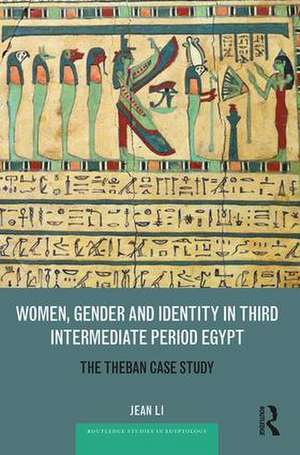Women, Gender and Identity in Third Intermediate Period Egypt: The Theban Case Study: Routledge Studies in Egyptology
Autor Jean Lien Limba Engleză Hardback – 16 ian 2017
Taking a methodological and material culture-based approach which adds new dimensions to scholarly and popular understandings of ancient Egyptian women, this fascinating and important study will aid scholars of Egyptian history and archaeology, and anyone with an interest in women and gender in the ancient world.
| Toate formatele și edițiile | Preț | Express |
|---|---|---|
| Paperback (1) | 382.91 lei 6-8 săpt. | |
| Taylor & Francis – 12 dec 2019 | 382.91 lei 6-8 săpt. | |
| Hardback (1) | 848.54 lei 6-8 săpt. | |
| Taylor & Francis – 16 ian 2017 | 848.54 lei 6-8 săpt. |
Preț: 848.54 lei
Preț vechi: 1140.92 lei
-26% Nou
Puncte Express: 1273
Preț estimativ în valută:
162.39€ • 167.76$ • 135.15£
162.39€ • 167.76$ • 135.15£
Carte tipărită la comandă
Livrare economică 25 martie-08 aprilie
Preluare comenzi: 021 569.72.76
Specificații
ISBN-13: 9781138125421
ISBN-10: 1138125423
Pagini: 196
Dimensiuni: 156 x 234 mm
Greutate: 0.5 kg
Ediția:1
Editura: Taylor & Francis
Colecția Routledge
Seria Routledge Studies in Egyptology
Locul publicării:Oxford, United Kingdom
ISBN-10: 1138125423
Pagini: 196
Dimensiuni: 156 x 234 mm
Greutate: 0.5 kg
Ediția:1
Editura: Taylor & Francis
Colecția Routledge
Seria Routledge Studies in Egyptology
Locul publicării:Oxford, United Kingdom
Cuprins
Introduction
Chapter One: Tradition, Innovation and a Search for Egyptian Identity in the Third Intermediate Period
Chapter Two: Rank, Status and Axes of Identity
Chapter Three: Materiality, Memory and the Mortuary Landscape of Thebes
Chapter Four: The Symbolic Economy of Mortuary Practices
Conclusion: Women, Gender and Status in Thebes of the 8th-6th Centuries BCE
Chapter One: Tradition, Innovation and a Search for Egyptian Identity in the Third Intermediate Period
Chapter Two: Rank, Status and Axes of Identity
Chapter Three: Materiality, Memory and the Mortuary Landscape of Thebes
Chapter Four: The Symbolic Economy of Mortuary Practices
Conclusion: Women, Gender and Status in Thebes of the 8th-6th Centuries BCE
Notă biografică
Jean Li is Assistant Professor in the Department of History at Ryerson University, Canada. Her research focuses on Egyptian art and archaeology in the first millennium BCE, and she is especially interested in using recent anthropological and archaeological theories to study ancient cultural products.
Recenzii
Li states her research goals clearly and the methods she utilizes to reach those goals are direct. The author is succinct in her writing and provides enough detail for the reader to follow her thought process and argumentation. Her work provides an excellent framework for future studies concerning women and identity and also breaks new ground with its discussion of women as individuals, rather than as a monolithic group. Women, Gender and Identity in Third Intermediate Period Egypt would be a great asset to upper level undergraduates and graduate students studying issues of identity and gender within an ancient Egyptian context; for the latter group, it offers an instructive model for students conducting research on these issues.
-Amanda Jane Shaffery, University of Memphis
-Amanda Jane Shaffery, University of Memphis
Descriere
This volume clarifies the role of women in Egyptian society during the first millennium BCE, allowing for more nuanced discussions of women in the Third Intermediate Period. Unlike past studies which have relied heavily on literary evidence, Li presents a refreshing material culture-based analysis of identity construction in elite female burial practices. With a particular focus on the city of Thebes, this close examination of the archaeology of women’s burial presents an opportunity to investigate the social, professional and individual identities of women beyond the normative portrayals of the subordinate wife, mother and daughter.





